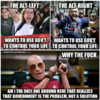- Sep 21, 2004
- 46,548
- 52,865
- AFL Club
- GWS
It was written in 1992 and posits that liberal democracy is the ideological endpoint of human organisation. He distinguishes between the ideal and the material. He believes the victory of liberal democracy is in the ideal, and would eventually be implemented in the material.
"What we may be witnessing is not just the end of the Cold War, or the passing of a particular period of postwar history, but the end of history as such: that is, the end point of mankind's ideological evolution and the universalization of Western liberal democracy as the final form of human government. This is not to say that there will no longer be events to fill the pages of Foreign Affair's yearly summaries of international relations, for the victory of liberalism has occurred primarily in the realm of ideas or consciousness and is as yet incomplete in. the real or material world. But there are powerful reasons for believing that it is the ideal that will govern the material world in the long run."
26 years later, he's underestimated 2 challenges, and they both come from the conservative right. Islamism, and white nationalism and other nationalisms.
1. He brushes over Islamism. Mainly because it's a very Anglocentric analysis (which I am also providing). But liberalism is no closer to penetrating over there than it was 27 years ago. Sure, there are material factors here (military deals with Islamist states) but many reject the idea of liberalism. Some don't see freedom, they see bombs. Others just have a pre-Enlightenment mindset. Or that consumerism is empty and nihilstic. History is still occurring there.
2. Yes, Trump is a circus performer. And it's hard to separate the ironic 'Off to the gas chambers' from the real 'Off to the gas chambers'. But he's the PR head of a nationalist movement that rejects the liberal state. The coded and not so coded appeals to authoritarianism that has infected racialist movements across the US and Europe contradicts the notion liberal democracy is not contested. Luckily, they're so buffoonish (Brexit, Trump) they may have already peaked.
The left? Marxism is dead, cultural Marxism doesn't actually exist. It appears they are operating firmly within the framework of liberal democracy, albeit at the more re distributive end. Ironically enough, they are the ones looking to preserve the liberal state.
How do you see things?
"What we may be witnessing is not just the end of the Cold War, or the passing of a particular period of postwar history, but the end of history as such: that is, the end point of mankind's ideological evolution and the universalization of Western liberal democracy as the final form of human government. This is not to say that there will no longer be events to fill the pages of Foreign Affair's yearly summaries of international relations, for the victory of liberalism has occurred primarily in the realm of ideas or consciousness and is as yet incomplete in. the real or material world. But there are powerful reasons for believing that it is the ideal that will govern the material world in the long run."
26 years later, he's underestimated 2 challenges, and they both come from the conservative right. Islamism, and white nationalism and other nationalisms.
1. He brushes over Islamism. Mainly because it's a very Anglocentric analysis (which I am also providing). But liberalism is no closer to penetrating over there than it was 27 years ago. Sure, there are material factors here (military deals with Islamist states) but many reject the idea of liberalism. Some don't see freedom, they see bombs. Others just have a pre-Enlightenment mindset. Or that consumerism is empty and nihilstic. History is still occurring there.
2. Yes, Trump is a circus performer. And it's hard to separate the ironic 'Off to the gas chambers' from the real 'Off to the gas chambers'. But he's the PR head of a nationalist movement that rejects the liberal state. The coded and not so coded appeals to authoritarianism that has infected racialist movements across the US and Europe contradicts the notion liberal democracy is not contested. Luckily, they're so buffoonish (Brexit, Trump) they may have already peaked.
The left? Marxism is dead, cultural Marxism doesn't actually exist. It appears they are operating firmly within the framework of liberal democracy, albeit at the more re distributive end. Ironically enough, they are the ones looking to preserve the liberal state.
How do you see things?





